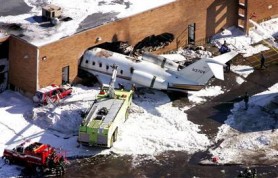The pilot of a Guyanese-operated jet charter firm that came under federal scrutiny following a 2005 crash, yesterday pleaded guilty to making dozens of illegal flights, as part of what prosecutors charged was an “anything goes” scheme by the company to pump up profits, according to news website nj.com.
Francis Vieira, 60, of Ft. Lauderdale pleaded guilty in a New Jersey Federal Court, just weeks before he was set to go to trial with four others of the now-grounded Platinum Jet Management LLC. Vieira faces up to five years in prison and a $250,000 fine when he is sentenced in January.
According to the report, Vieira told assistant US Attorney Scott B. McBride that he falsified flight logs, altered weight and center of gravity graphs, and routinely flew illegal charter flights that violated federal safety regulations.
Dressed in a dark suit and glasses, Vieira stood before US District Judge Dennis Cavanaugh as he pleaded guilty to conspiracy to commit wire fraud and to defraud the United States.

According to prosecutors, Platinum, which counted among its passengers the rich and famous— including athletes, musicians and other high-end clients who paid as much as $90,000 per charter— was not certified to fly commercial charters. The company was also accused of misrepresenting itself and dispatching pilots not qualified to be in the cockpit.
The US Attorney’s office said that the company worked to boost profits by routinely overloading planes with fuel at airports where it was cheaper—even when it caused the aircrafts to exceed allowable takeoff and landing weights—and then lying about the weight on flight manifests.
Platinum came under investigation after a Challenger CL-600 twin-engine jet crashed at Teterboro on Feburary 2, 2005. Investigators found that the jet, chartered by a New York equity firm with eight passengers on board, was nose-heavy and unable to lift off at the speed it was traveling.
The pilot of the flight, John Kimberling, aborted the takeoff, but was unable to stop, and slammed through an airport fence and across a busy roadway before hitting a car and crashing into the side of a warehouse. The cabin aide—a Miami model and dancer—did not know how to open the door of the plane to evacuate those inside. No one was killed, but all 11 people on the plane were injured, as were several others on the ground.
Vieira, who was not behind the controls of the flight that crashed, was among six other company officials ultimately charged in the case. Among them were Kimberling, who according to a National Transportation Safety Board report, had been fired from a previous job for safety-related issues and poor airmanship, and had lied about his experience on job applications.
Also facing trial are Michael Brassington, the president, CEO, chief pilot and co-founder of Platinum Jet; his brother, Paul Brassington, a vice president and co-founder of Platinum Jet; and Brian McKenzie, director of maintenance. The Brassington brothers as well as most of the other accused are Guyanese.
Two others, Joseph Singh, director of charters, and Andre Budhan, a co-founder of the company, threw in the towel months ago but they are yet to be sentenced and are out on bail.
Platinum was shut down by the Federal Aviation Authority (FAA) after the accident.
Vieira’s attorney, Neal Sonnett of Miami, told reporters outside of court that his client had been under significant pressure and there were mitigating circumstances at play that will come out before he is sentenced.
“He’d like to move on with his life,” said Sonnett.
After the crash, the aircraft skidded off the runway and eventually crashed into a warehouse, causing a fire. In the indictment, the men are accused of “routinely undertaking and concealing dangerous fuelling and weight-distribution practices” over a three-year period, in or about November 2002 to in or about March 2005. Michael Brassington, McKenzie and Vieira are accused of filing paperwork on numerous occasions that fraudulently claimed that the planes being flown by Platinum out of Teterboro were up to 1,000 pounds lighter than their actual weight, in violation of FAA regulations.
It is alleged that Michael Brassington would instruct the company’s pilots to maximise charter profits by “tankering” fuel, involving loading extra fuel on the aircraft at locations where Platinum Jet had contracts for comparatively cheap fuel prices, like Teterboro Airport. The men would falsify FAA-required weight-and-balance graphs to conceal the weight configuration. Pilots were also instructed to do the same.
Such “tankering,” according to the indictment, caused the aircraft to exceed their maximum allowable take-off and landing weights and forward Centre of Gravity (COG) limits, thereby endangering the safety of the aircraft during takeoff, flight and landing.
Additionally, the men are accused of having solicited charter flight customers for Platinum Jet using charter brokers, misrepresenting that it was acting in compliance with safety standards. In this regard, they allegedly said that the company’s on-demand commercial flights were actually non-commercial flights, which it was not certified to fly. During the period listed in the indictment, they are reported to have flown 85 such flights for more than US$1 million in compensation.
They are also accused of using unqualified pilots who failed to meet the FAA requirements and the indictment alleges that the captain of the ill-fated 2005 Teterboro flight was not certified to fly the commercial flights.



